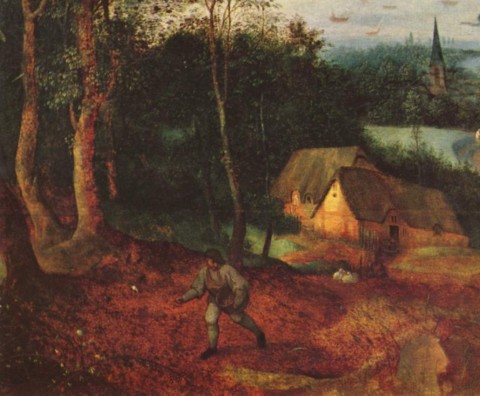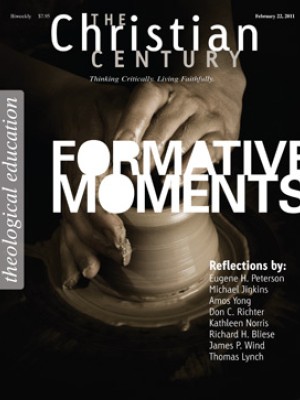Seeds and sowers: A congregation confronts a parable

The Bible has the power to generate new meaning in new contexts and thereby to affirm both unity and diversity in communities whose members engage one another around the text. To show students this way of engaging biblical literature, I often show them clips from a television series hosted in the 1990s by Bill Moyers, "Genesis: A Living Conversation." Each of its one-hour sessions brought a handful of people together to focus on a single short story from Genesis. They sat in a circle and talked about the story, keeping their comments and questions grounded in the details of the text.
One gets the feeling from the conversation that there are just as many versions of the story as there are people in the room. Nevertheless, the different voices stay connected through respectful, even if contentious, conversation. At the end there is no final word on what the story means. But there is a richer, deeper appreciation for the biblical story, for the questions it raises and for how those questions relate to the experiences of the participants.
Read our latest issue or browse back issues.
Last year our church developed an adult education program inspired by the "living conversation" model. Around the same time, my wife, Clover, and her pastoral colleague, John Lentz, began asking how they might bring some of the same participatory spirit of biblical interpretation into the worship service. Could they get away from the traditional, one-way mode of sermonic communication, in which the preacher tells the congregation what she or he believes the Bible is saying, and they passively receive it?
In that spirit, Pastor Lentz "preached" on Jesus' parable of the sower in the Gospel of Matthew. He began with a few brief introductory remarks to set up the passage. Parables, he explained, are like extended metaphors, in which something familiar, like a story about planting seeds, is compared to something unfamiliar, like the kingdom of God. Scholars believe that the parable was Jesus' signature mode of teaching— which is interesting because, like all metaphorical thinking, parables offer poetic meaning that is not easily nailed down in a simple equation of "this equals that." Jesus' parables often seem to confuse and complicate rather than clarify and simplify, even for his disciples.
With this particular parable in Matthew, there's actually an interpretation that follows. But that explanation wasn't originally part of the teaching. It was added later. Pastor Lentz proposed that we focus on the parable alone, let it stand without explanation, and see what we can see.
A member of the congregation read the passage.
Listen! A sower went out to sow. And as he sowed, some seeds fell on the path, and the birds came and ate them up. Other seeds fell on rocky ground, where they did not have much soil, and they sprang up quickly, since they had no depth of soil. But when the sun rose, they were scorched; and since they had no root, they withered away. Other seeds fell among thorns, and the thorns grew up and choked them. Other seeds fell on good soil and brought forth grain, some a hundredfold, some sixty, some thirty. Let anyone with ears listen! (Matt. 13:2–9)
After a minute of silent reflection, Pastor Lentz invited people in the congregation to share their first impressions of the parable. A well-liked gentleman with a booming voice who regularly participates in adult education classes spoke first, summarizing the "Sunday school" version many people know. It's about God planting seeds of grace and salvation in different people, he explained. Some people, maybe one in four, have "good soil" and the seed thrives in them; in most, however, it doesn't take.
"Are you familiar with that message?" the pastor asked the congregation. Nearly everyone nodded. "Well, how does it make you feel?" People began to perk up. Several scooted forward in their seats.
"I must be one of those bad guys with bad soil," one man said.
"I worry, what have I done with the seed in me?" a woman called out.
"Where's my seed?" a high school boy asked. Others laughed and nodded.
These honest first responses quickly broke open the text and the congregation. New possible meanings, rereadings, began to emerge. Maybe each of us has all kinds of soils in us. Have the birds gotten a bad rap? After all, they don't just take seeds away. They spread them to new places. Seeds have lots of chances to take. Surely Jesus' agriculturally minded audience would've known that.
What about the one sowing the seeds? Shouldn't he know where and where not to sow? Is he being rational, practical? He's just scattering seeds all over the place, with no discretion. His actions seem downright wasteful and excessive. If we think of the sower as God, what does that say? Maybe that God is not stingy or even careful about where he scatters the seeds? That divine grace is lavishly, uneconomically, improvidently broadcast all over the place?
And what if we are the sowers? What does the life of faith look like from that angle? We too can be carelessly, wastefully free. As we talked and as the excitement of the congregation grew more and more palpable, I imagined children playing in heaps of seeds, tossing them into the air like balls in a McDonald's play area. An image of the kingdom of God.
Pastor Lentz had wisely trusted that simply hosting a gathering of these people and this text would produce new fruit, and he remained open to whatever surprises that might bring. By the end of the "sermon," the pastor's role had changed from preacher to facilitator. There was no wrapping up, no bringing it all back to a single point. The open-ended process of rereading had itself become a sacramental moment, a means of receiving and sharing seeds of grace. The many voices remained present in all their diversity of insight and experience, echoing in and through the final Amen.
The great rabbi Yosef Chaim once described the din of students reading, interpreting and debating passages of Torah in their house of study as words rising through the roof and up to heaven. The indecipherable racket of the many voices interpreting scripture was like a hymn of praise to God. He imagined God glorying in the ongoing, noisy process of interpretation, the cacophony of meanings without end.
In kindred spirit, what if we were to think of the word of God not as bound between two covers of a book but as that endless noise of interpretation, an inconclusive process that we are invited to join? What if that cacophonous hymn, rising up across time and space from digital networks, living rooms, lunchrooms, churches and bus stops is the living word of God? An endless, inarticulate din of talking, arguing, reading and rereading in the library of questions. The word as we live it. Word without end.
This essay is exerpted from The Rise and Fall of the Bible: The Unexpected History of an Accidental Book. Copyright © 2011 by Timothy Beal. Used by permission of Houghton Mifflin Harcourt. All rights reserved.






